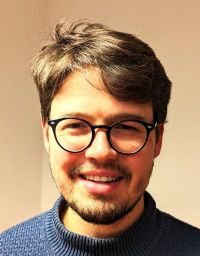Making Machine Learning obey the laws of physics

How can machine learning help us understand the physical world, from the smallest atom to complex industrial systems? That’s the question driving Dr. Malte Esders, who is part of the Machine Learning group at BIFOLD , supervised by Prof. Dr. Klaus-Robert Müller. In his PhD Thesis, titled “Regularization of Neural Networks for Quantum Systems”, Esders explored how neural networks can be adjusted to better model quantum-chemical phenomena.
With an academic path that spans cognitive psychology, computational neuroscience, and quantum chemistry, Esders moves effortlessly between disciplines. Before joining BIFOLD, he studied at Utrecht University, UC San Diego, the Bernstein Center Berlin, and Harvard University, where he developed an image-segmentation method still used years later. He is currently completing projects on long-range atomic interactions — forces that act between atoms even across relatively large distances. In the future, he plans to turn his attention to materials science and biochemistry. He wants to study how matter behaves across vastly different scales and hopes to explain these phenomena using machine learning models.
Please describe and explain your research focus.
Malte: Much of my work focuses on understanding how atoms and molecules interact, the fundamental processes that make up the physical world. To achieve this, I utilize Machine Learning Force Fields (MLFFs), which are machine learning models trained to predict the forces acting on atoms. These models enable us to simulate chemical systems with high accuracy, but at a fraction of the computational cost of traditional quantum mechanical approximations.
In my research, I aim to improve such MLFFs. Specifically, I test which known chemical principles these MLFFs violate and search for ways to align them more closely with such fundamental principles.
What are your recent projects?
Malte: After learning about the low-level theory underlying Quantum Chemistry, I would now like to move up in the abstraction ladder and learn more about Biochemistry and Materials Science. In the meantime, I’m finalizing two projects that relate to the scatter of atom-atom interactions at higher distances. These long-range interactions are subtle but play a crucial role in determining how molecules bind, fold, or react.
Which major innovations do you expect in your research field in the next ten years?
Malte: I believe the major innovations have already taken place, but much fine-tuning is still needed to make our models trustworthy in a variety of settings. An interesting research focus will be on generating entirely new molecules with desired properties.
Which living or historical scientist has fascinated you?
Malte: I admire Geoffrey Hinton. He began his career in experimental psychology before turning to machine learning. What fascinates me is how he continues to explore the parallels between artificial neural networks (ANNs) and biological neural networks (BNNs) — essentially, between machines and the human brain. He’s searching for biologically plausible learning mechanisms, bridging insights from neuroscience and AI. With my own background in Psychology, Neurobiology, and Computational Neuroscience, this area continues to fascinate me to this day, although I do not currently pursue research in this direction.
AI is considered a disruptive technology - in which areas of life do you expect the greatest upheaval in the next ten years?
Malte: I expect that Large Language Models (LLMs) will have the largest impact in the next few years. The impact can be both positive and negative. On the one hand, large amounts of unstructured tests could significantly accelerate scientific discovery. On the other hand, I am concerned about LLMs, particularly as social media bots. This development has already started on X and Reddit and needs to be addressed urgently.
Where would one find you if you are not sitting in front of the computer?
Malte: I most enjoy spending time with my partner and our daughter, particularly going for walks in the mountains.

